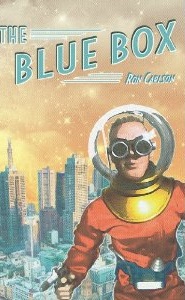The Blue Box
It’s the rare book that will compel me to read it aloud rather than silently, and reading The Blue Box by Ron Carlson turned out to be one of those experiences. Flash fiction is a genre that can so easily become pretentious or overly complicated. To fit a distinct narrative voice in such a short span of time while also enticing the readers with an intriguing plot, humor, and depth is no easy feat, but Carlson seems to accomplish it all with little more than a snap of his fingers. Though the circumstances in the stories were often surreal, the voice felt cemented in a witty hyper-reality. It’s the rare book that will compel me to read it aloud rather than silently, and reading The Blue Box by Ron Carlson turned out to be one of those experiences. Flash fiction is a genre that can so easily become pretentious or overly complicated. To fit a distinct narrative voice in such a short span of time while also enticing the readers with an intriguing plot, humor, and depth is no easy feat, but Carlson seems to accomplish it all with little more than a snap of his fingers. Though the circumstances in the stories were often surreal, the voice felt cemented in a witty hyper-reality. I wanted to speak the way Carlson wrote: effervescent, honest, sometimes snide, and often giggle-inducing.
This is not to say that I loved all of the stories, because I didn’t. I thought that the few at the end, in the fourth section, fell flat compared to the rest of the collection. Carlson had introduced such a fantastic narrative voice that I was almost disappointed to see dialog and more of a traditional storytelling format. In a way, this is a compliment to the first three sections of the collection. I craved more of it; 96 pages felt far too short.
The most significant attribute of Carlson’s writing style—more often a stream of consciousness than lyrical—is that he finds a way to take those moments that most of us have experienced, the moments that we look back on years later and find ourselves cringing at, and makes them okay. Embarrassing, but okay. Anyone who has had their heartbroken has likely had the same thoughts as the following passages, but it isn’t often that the harsh reality of desperation is allowed to bloom without judgment or shame:
I want to tell you right now that you’re going to have to have to look everywhere, and it is going to be tiring and frustrating, like if your knees hurt and you still haven’t looked down that one street, you’re going to have to go all the way down there and look around and under things and I’ll tell you right now, there’s no other love like me down there. Even if you get on an airplane and start looking over miles at a time looking down on everything and everybody: no way [. . .] Drink lots of water on your search and be careful driving, and from time to time remember the boy who loves you, who stands exactly where you haven’t looked [. . .] to see if you want marmalade and cheese on your toast. It’s going to pop up in a minute and he knows you like it warm. Even though it reads as being a bit pathetic, it’s also relatable. In creating characters like this and allowing the freedom for them to expose weaknesses, the stories find their wit and charm.
By far, my favorite stories in the collection were the graduate school recommendation letters written for, without a doubt, some of the worst potential students that a school could hope to have. Seeing as Ron Carlson is a professor, one has to wonder whether any of these were based on real people. Fire starting, class-time napping, and stalking are just a few of the shining stars on the academic resumes of students from the fictional Herdah College. Were I an admissions advisor reading these letters, I would be tempted to actually admit these students not only to see their antics, but also because the author of the letters never quite uses the students’ odd traits as negatives. As a reader, there’s a sense of confidence in these oddballs conveyed by their professor. It’s that sensibility that permeates the entire collection. The stories and poems are odd. They’re goofy and moody and thoughtful, but you can tell that they are written with love and care by Carlson.
There is an undeniable deftness with language and form The Blue Box. Reading it was joyful. As someone who is an admittedly slow reader, I relished in being able to finish this in an afternoon. It was a tiny break from reality, and from standard story structures, that I would gladly make time for again.





